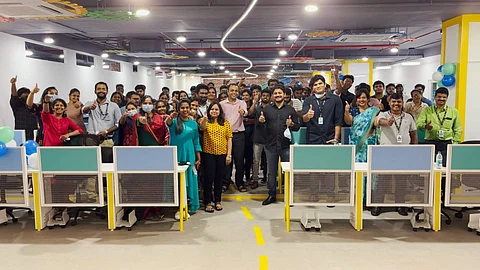

While pursuing his Master's at the University of Wisconsin, Madison in 2011, Suryanarayanan P met Sarangarajan I. The duo was enthralled by the practical approach to education there. "Engineering education in India is more focused on theory. However, in graduate schools in US or Europe, they expect you to apply what you have learned on a computational tool that predicts or designs what you want and test it," says Suryanarayanan. "There is a lack of industry-oriented skills in the Indian engineering education system and nothing has been altered in the last 15 years. What can be done is to base the coursework around what people actually do in the industry," says Suryanarayanan. This is what prompted the duo to develop their EdTech platform Skill-Lync, which focuses on imparting industry-relevant skills to engineers.
Based out of Chennai, Skill-Lync was launched in 2016 with a major focus on Mechanical Engineering courses. "Both Sarangarajan and I are Mechanical Engineering graduates," says Suryanarayanan. Over the period of the next few years, the duo built courses on Electrical, Civil, Electronics and Computer Science Engineering. But the courses that set Skill-Lync apart are the ones on electric vehicles. "We teach courses on electric vehicle design and development, hybrid electric vehicles, autonomous driving and passenger car development," he adds.
The courses, says Suryanarayanan, are more technical in nature. "Over the last two decades, the role of mechanical engineers have developed. Mechanical engineers now design products and analyse them using computational tools. For example, consider a car. Even before it is prototyped, it will be sketched on Autodesk Alias. The different components will then be built and tested. At undergrad engineering schools in India, only the theoretical part of this is taught but not its application," says Suryanarayanan, adding, "This is the gap we are trying to bridge."
Over 15,000 engineering students have registered on Skill-Lync, where these courses last for a period of eight months at the end of which a postgraduate diploma is awarded to the candidate. "We develop niche courses in very specific areas. There are 120 courses on the platform while another 180 are still being developed. Around 60% of the courses are in the Mechanical Engineering domain, 25% are in Electrical and Electronics, 10% are in Civil Engineering and the remaining 5% of courses are in Computer Science," says Suryanarayanan. After COVID-19 and the ensuing lockdown, Skill-Lync offered one coursework for free.
Throughout the eight-month-long course, students are not only exposed to recorded lectures and live classes for clearing doubts but are also able to work on simulation computational tools and industry projects. "Every week, the students have to complete classes for 20 hours. After the course is completed, they will receive a certificate," says Suryanarayanan. Skill-Lync has a team of around 300 people. "And around 200 instructors, who have more than ten years of experience in the industry. Sixty per cent of these people are from India and the remaining 40% are from the US. These people usually work in companies like Ford, Tesla, Google and General Motors, among others," concludes Suryanarayanan.
